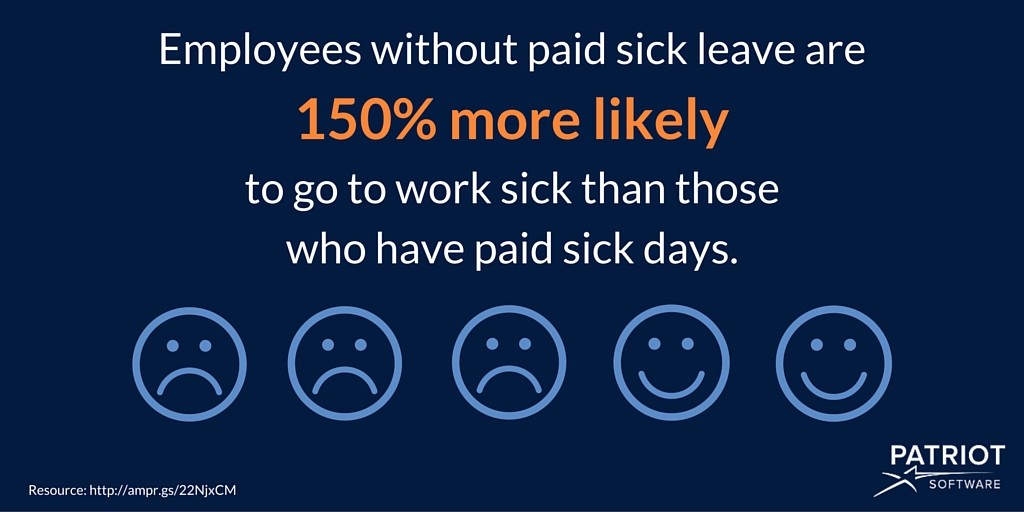
Sickness benefit is a social protection system paid as a fixed rate of previous earnings or a flat-rate amount.Sick leave is a right to be absent from work during sickness and return to one's job when recovered.

European Union Įach European Union (EU) Member State has domestic sick leave and sickness benefits: Existing provisions Īt least 145 countries require paid sick leave for short- or long-term illnesses, with 127 providing a week or more annually. For workers in the foodservice industry, one analysis found that foodborne illness outbreak for a chain restaurant – including negative public opinion, which affects other operations in a metropolitan area – can be up to $7 million. For employers, this costs an average of $255 per employee per year and exceeds the cost of absenteeism and medical and disability benefits. economy $180 billion annually in lost productivity. The total cost of providing paid sick leave in that high-cost market was estimated to be around 40 or 50 cents per hour worked. In 2010, a non-random survey of some New York City employers by the Partnership for New York City estimated that introducing a new paid sick leave mandate, in which employees of small businesses would get a minimum of five days paid sick leave per year and employees of large businesses would get a minimum of nine days paid sick leave per year, would increase total payroll expenses in the city by 0.3%, with the burden largely falling on the fraction of businesses that did not already pay for any sick leave, or that offered sick leave only to long-time employees. According to a 2020 study, requiring paid sick leave in Washington state led to a reduction in the number of workers who reported working while sick. Thirty percent of workers report they contracted the flu from a colleague. Nearly half reported that they went to work sick because they could not afford to lose the pay. workers (68 percent) report they have gone to work with the stomach flu or other contagious disease. Workers without access to paid sick leave will go to work while sick, which spreads the infections to other workers. Working parents without paid sick days may feel compelled to send their sick children to school, where the children spread infections to other students and school staff, and additionally experience negative short- and long-term health outcomes themselves. Parents who have access to paid sick leave are more likely to take time away from work to care for their sick kids. Paid sick leave can reduce the overall frequency of time off work, as workers are less likely to spread disease to co-workers and the surrounding community. Workers with paid sick leave are less likely to experience workplace injuries. Workers without paid sick leave are also less likely to obtain preventive medical care, such as cancer screenings and flu shots. Studies show that workers are less likely to take time off for injury or illness when they do not have paid sick leave. Paid sick leave can reduce employee turnover, increase productivity, and reduce the spread of disease in the workplace and in the community.

However, in countries with poorer labor laws such as South Korea, employees are usually forced to use paid vacation time for sick leaves, and the sick leaves exceeding the remaining vacation time are unpaid.Įven where sick leave is normally required for all employees, the business owner may not be considered an employee or have access to paid sick leave, especially in a microbusiness that is operated by the owners. In nations without laws mandating paid sick leave, some employers offer it voluntarily or as the result of a collective bargaining agreement. Most European, many Latin American, a few African and a few Asian countries have legal requirements for paid sick leave for employees. In most nations, some or all employers are required to pay their employees for some time away from work when they are ill. Menstrual leave is another type of time off work for a health-related reason, but it is not always paid.

Some policies also allow paid sick time to be used to care for sick family members, or to address health and safety needs related to domestic violence or sexual assault. Sick leave can include a mental health day and taking time away from work to go to a scheduled doctor's appointment. It differs from paid vacation time or time off work to deal with personal matters, because sick leave is intended for health-related purposes. Sick leave (or paid sick days or sick pay) is paid time off from work that workers can use to stay home to address their health needs without losing pay.

For the "Weird Al" Yankovic song, see Bad Hair Day.


 0 kommentar(er)
0 kommentar(er)
